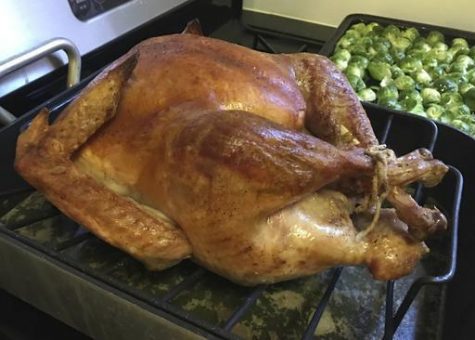Sleepy Science: The real reason you’re tired after holiday meals
December 7, 2016
With droopy eyes and a full stomach, you lay down for a nap after feasting on a holiday dinner.

A Thanksgiving meal in 30 minutes is quite possible. Turkey cutlets, instant stuffing and canned cranberry sauce turn the labor intensive meal into a possibility for any night of the year, or for after a long work day on Thanksgiving.(AP Photo/Larry Crowe)
This so-called “food coma” has traditionally been blamed on an increase in an amino acid called tryptophan, which is an essential component in the sleep-causing neurotransmitter known as melatonin. This increase in tryptophan is blamed on turkey, since it’s known to carry the amino acid. However, tryptophan is not the cause of the post-Thanksgiving food coma.
“This story about tryptophan in turkey is just kind of a running joke,” said Dr. Nicolaas Deutz, a professor at the Center for Translational Research in Aging and Longevity.
According to Dr. Richard Jay Wurtman, Professor of Neuroscience at the Massachusetts Institute of Technology’s Department of Brain & Cognitive Sciences, blood tryptophan is not guaranteed to cross the blood brain barrier because it has to compete with all the other amino acids for the carrier protein.
In other words, even though it is in our bloodstream, the tryptophan has yet to be converted to melatonin, so it would not make us tired.
So then why are we so tired after these holiday meals?
Wurtman says that the “large amounts of fats and carbohydrates in the meal” causes an increase in insulin, a hormone that takes glucose and amino acids in the bloodstream into the cells.
The increase of blood tryptophan can lead to an increase in serotonin which is “chemical precursor of melatonin.” However, according to Scientific American, an increase in tryptophan is not an automatic increase in melatonin.
Another cause of the “food coma” is overeating, said Dr. Sasha Stiles, an obesity specialist at Tufts Medical Center, on National Public Radio’s morning edition. As previously stated by Wurtman, the carbohydrates eaten with the Thanksgiving meal produces insulin.
However, sometimes insulin production doesn’t stop before too much sugar is removed. This leads to feeling “tired, dizzy, nauseous, even depressed,” said Stiles.
Stiles explained that low blood pressure can lead people to eat more “high-sugar foods to bring their blood sugar back up to normal and make them feel better.” She explained that it’s like a yo-yo: the more someone overeats, the more the brain will believe they are not full because the stomach will stop sending the brain signals that they are full.
Besides feeling tired after a holiday dinner, Dr. Joe Bass of Northwestern University explained in the same NPR report that overeating can change the natural clock that the body possesses.

In a mice study at his lab, Bass found “if mice eat a high-fat diet, they actually wake up during what is night-time for them and eat.” Bass explained that what he found in the mice would be the human equivalent of “waking up every night during holiday season and eating all the sweets in your refrigerator.”
In addition to overeating, there is another phenomenon called the “parasympathetic tone [that] is conducive to sleep,” Heller said in Scientific American.
Parasympathetic tone is a part of the autonomic nervous system. According to the Medical Dictionary, this part of the nervous system “tends to stimulate digestive secretions, slow the heart, constrict the pupils, and dilate blood vessels”.
The purpose of the parasympathetic tone is to conserve energy. This can directly translate into tiredness, explained Scientific American.
From meat to carbohydrates to natural body chemistry, many elements play a role in the “food coma”, so it’s important to listen to your body this holiday season.


